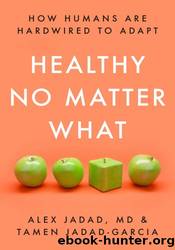Healthy No Matter What: How Humans Are Hardwired to Adapt by Alex Jadad

Author:Alex Jadad [Jadad, Alex & Jadad-Garcia, Tamen]
Language: eng
Format: epub
Published: 2023-01-30T00:00:00+00:00
WHEN IS ENOUGH ENOUGH?
Since the industrial revolution, there has been a flare-up of an old human ailment that is highly contagious and distressing and that has remained widely unchecked: overconsumption and its consequences, also known as âaffluenza.â
Affluenza is a socially transmitted condition that results âfrom the dogged pursuit of more.â Its manifestations are clear in the US, the most afflicted country in the world. From 1986 to 2021, for instance, the nationâs consumer spending consistently made up more than 60 percent of GDP, trending toward 70 percent year over year.
Could this pattern of extreme consumption be driven by a need to fulfill a significant lack? This is hardly the case. Americans represent 4 percent of the worldâs population and yet occupy 90 percent of the total space on the globe dedicated to self-storage. This detrimental condition is seen across all generations, not just adults with credit cards. American children, who represent 3 percent of the worldâs total child population, consume 40 percent of all the toys produced on the planet.
Although affluenza is an affliction driven by those in the wealthiest countries, it has spread throughout the world, impacting people at all income levels. Those at the bottom are stricken twice, since they are conditioned to want an opulent lifestyle but have few possibilities of attaining it. Some of the restrictions on fulfilling these aspirations are natural, as it is physically impossible for every person in the world to consume as much as the average person in a high-income country. Humans would need 3.8 earths to sustain this lifestyle for all. In contrast, if everyoneâs consumption matched the levels of the average person in the world, humanity would sit right at the level of sustainability and would even have a little breathing room.
This challenge is one that we have to face as a species. We essentially live in the digestive tract of a massive machine, surrounded by things that have already been consumed or by neatly packaged items ready to be used and turned into waste.
In any case, affluenza has created a culture that characterizes success with words such as âbigger,â âbetter,â âfaster,â and âgreater.â We are destined to fail because our desires are unlimited. We are, in fact, insatiable.
How does this affect your health or your ability to adapt? In prehistoric times, as groups of humans went through times of scarcity, a tendency to accumulate more food and nonfood items than needed was protective (to be stored for times of scarcity). Those who indulged were sending messages of fitness to potential mates and of a high capacity to protect others in the group as well as their own future offspring. This excess, however, came at a risk to our ancestors. Those carrying extra items could be spotted more easily by predators and rivals, and the items would make it more difficult for them to escape. In a way, we are the descendants of the hoarders who survived.
During the times of abundance that we are experiencing now, excess also comes at a cost, albeit a quite different one.
Download
This site does not store any files on its server. We only index and link to content provided by other sites. Please contact the content providers to delete copyright contents if any and email us, we'll remove relevant links or contents immediately.
The Body: A Guide for Occupants by Bill Bryson(5082)
The Longevity Diet by Valter Longo(5058)
Ikigai by Héctor García & Francesc Miralles(4247)
Limitless by Jim Kwik(3168)
The Checklist Manifesto by Atul Gawande(2848)
The Body by Bill Bryson(2620)
Memory Rescue by Daniel G. Amen(2418)
What Color Is Your Parachute? 2015 by Richard N. Bolles(2306)
Breath by James Nestor;(2297)
Becoming Myself by Irvin D. Yalom(2250)
Fat for Fuel by Joseph Mercola(2008)
Memory Rescue: Supercharge Your Brain, Reverse Memory Loss, and Remember What Matters Most by Amen Dr. Daniel G(1975)
Awakening Your Ikigai by Ken Mogi(1814)
The Daughter's Return by The Daughter's Return(1795)
Weight Training by Thomas Baechle(1771)
50 After 50 by Maria Leonard Olsen(1714)
Starting Over (Sugar Creek Romance ) by Jordan Silver(1686)
1610396766 (N) by Jo Ann Jenkins(1673)
Dirt by Bill Buford(1671)
